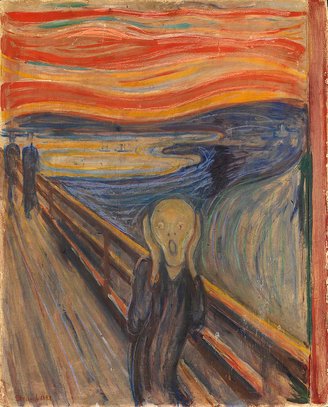“Part
of the agony of anxiety has to do with the fact that we feel that we
shouldn’t be anxious, or that it’s somehow wrong to be anxious and
that we’re the only anxious ones, and so on. It makes being anxious a
profoundly lonely experience, and the loneliness creates yet more
anxiety. Factoring in my anxiety instead of fighting it makes it
easier. It’s just there, like the weather.”
—- Comment in The Guardian
###
Are you anxious? I might as well ask, Are you breathing? If you’re not anxious, you’re not in this world. Even if you’re stoned, or living in a cave isolated from the outside world, you’re unlikely to be completely free of anxiety. To live is to be anxious; it’s in our genes.

Edvard Munch, 1893, The Scream (Public domain)
Once upon a time — a million years ago, say — anxiety bestowed immediate, life-giving benefits. That’s when we lived in an “immediate return environment” where actions got results right away. (Which is how non-human animals live.) You were threatened by a predator, you were dangerously dehydrated, you were faced with a life-and-death situation…and took immediate action. Threat-anxiety-action. If you were lucky, the threat was mitigated and you were back to no-anxiety, until the next time.
No such luck these days, living as we do in a “delayed return environment.” We’re bombarded with anxiety-inducing news daily, hourly even; our rent is due in a week and we don’t know how we’ll get the money to pay; if we don’t keep studying, we won’t get our diploma. That is, present actions define future rewards unlike during, say, the Pleistocene. Instead of momentary anxiety like that experienced by our ancestors, we suffer from chronic anxiety that isn’t going to be alleviated by some immediate action.
And no wonder! Many people make their living by nourishing anxiety in the rest of us. BigPharma: “Irritable? Talk to your doctor about this medication…” Media: “If it bleeds it leads.” (Go no farther than LoCO’s banner pics!) Have you been in an airport recently, with TV monitors spaced every 50 feet blaring their inescapable ain’t-it-awful news? (News, by the way, that’s weirdly homogeneous: a footballer’s latest peccadillo is reported in the same breathless tone as the U.S. leaving the Intermediate-Range Nuclear Forces Treaty, setting us on a nuclear arms race not seen since the 1960s.) Nothing I can realistically do about such news. No matter, up goes my anxiety level, without any hope of mitigation.
The extreme version of what most of us experience on a daily basis is GAD, Generalized Anxiety Disorder, the formal (as in Diagnostic and Statistical Manual of Mental Disorders DSM-5) medical condition characterized by at least six months of “excessive, uncontrollable and often irrational worry about events or activities.” According to Wikipedia, 4% of people are affected by GAD at some point in their lives, with women being affected twice as much as men. It differs from the “Black Dog” of depression, in that anxiety is accompanied by some measure of hope that things will turn out OK (usually with a heightened sensation of awareness) whereas depression is a hopeless, numbing state. From a recent article in The Guardian, “If you knew with absolute certainty that life from now on would bring only failure and defeat, you might well be depressed, but you wouldn’t feel on edge.”
Solutions, whether for mild anxiety or full-blown GAD abound: medications (e.g. Paxil), meditation (e.g. on-line Headspace and Insight Timer, and local meditation and/or mindfulness groups), CBT (cognitive behavioral therapy). And, for me, just recognizing that anxiety is built into my system. I’m not a bad person for feeling it. It’s natural and — had I been alive a million years ago — really, really useful for survival. I’m primed to react to the news; I don’t choose my feelings. (But I do choose not to have a TV or radio in our apartment, and to severely limit my exposure to non-local news.) Works most of the time.
Any stoners or hermits want to chip in about their experience with anxiety?
CLICK TO MANAGE